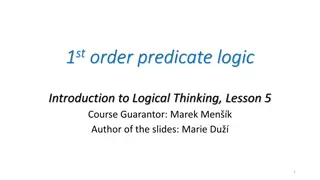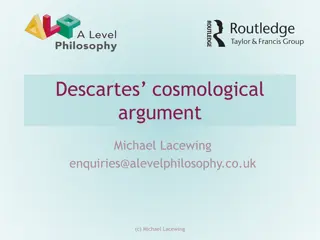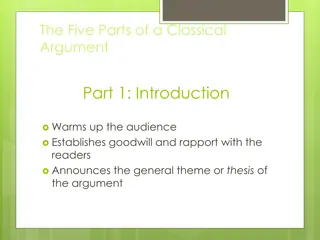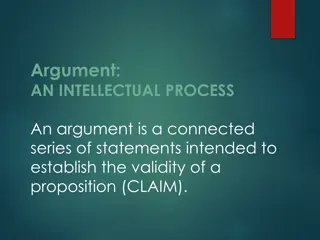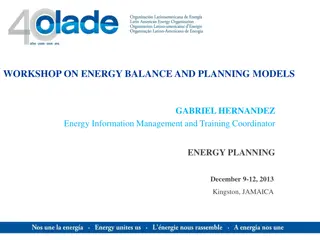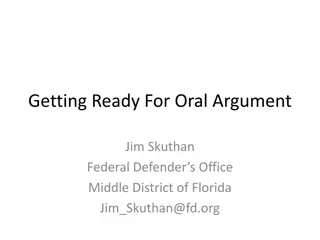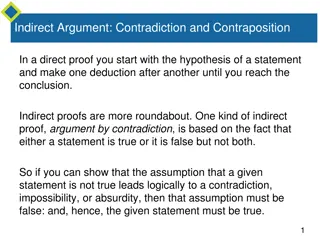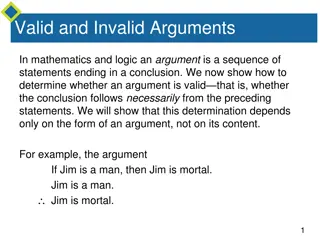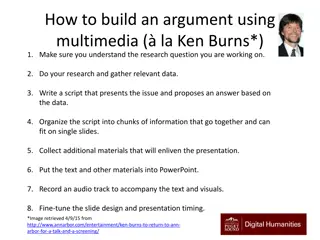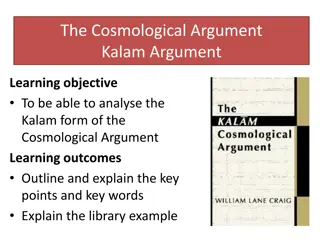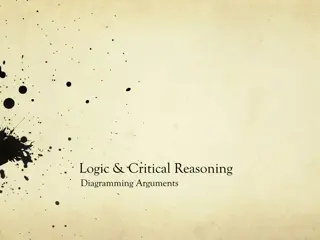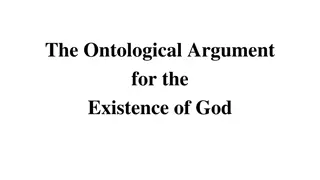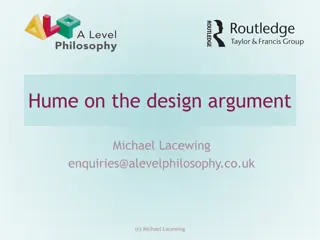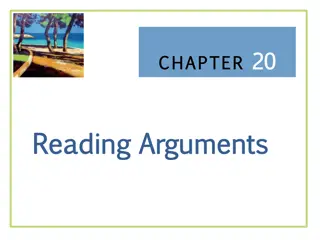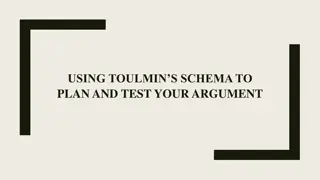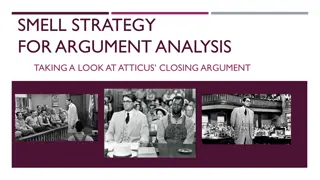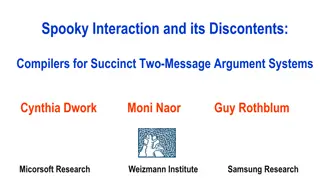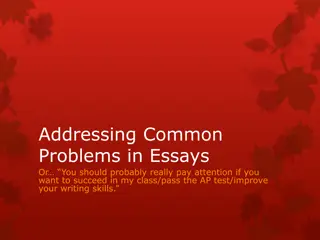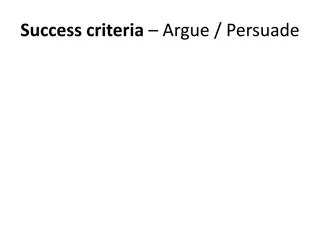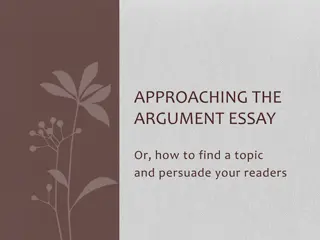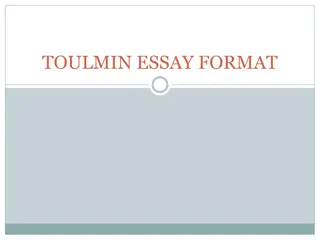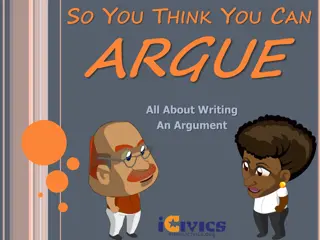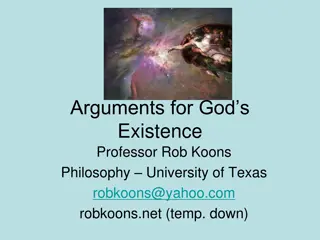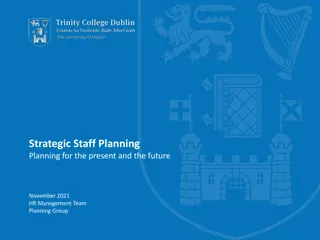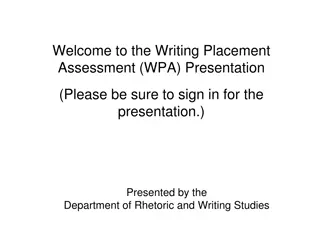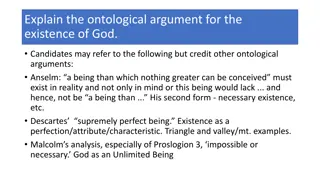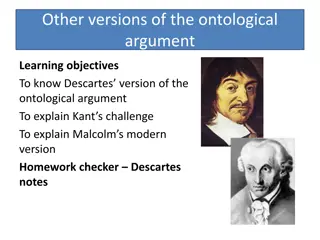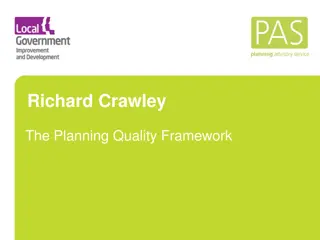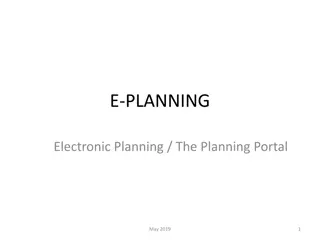The Semantic Argument for the Existence of God - International Conference Insights
Explore the Semantic Argument and its implications for the existence of God as presented by Emanuel Rutten at the International Proofs of God's Existence Conference. The lecture delves into universal properties, formal versus non-formal properties, and the likelihood of God's existence based on thes
0 views • 14 slides
Coherence and Cohesion
Cohesion and coherence play crucial roles in academic writing by ensuring logical flow and connection between ideas. Cohesion involves linking sentences using devices like conjunctions, pronouns, and repetition, while coherence focuses on organizing ideas into paragraphs that logically develop the a
0 views • 13 slides
Introduction to 1st Order Predicate Logic in Logical Thinking
Explore the limitations of propositional logic and the enhanced expressive power of 1st order predicate logic (PL1). Understand how PL1 allows for analyzing the structure of atomic propositions and proving arguments that depend on these structures. Through examples and valid argument schemata, delve
1 views • 26 slides
Descartes' Cosmological Argument and Existence Inquiry
Descartes presents a cosmological argument questioning the existence of anything, focusing on what causes his own existence. He explores different aspects such as perfection, dependency, and the idea of God as a necessary cause for existence. Challenges about the nature of continued existence are al
0 views • 17 slides
Understanding the Five Parts of a Classical Argument
The classical argument is composed of five main parts: Introduction, Narration, Confirmation, Refutation and Concession, and Summation. Each part plays a crucial role in presenting a well-structured and persuasive argument, with devices and strategies such as diction, syntax, and figurative language
0 views • 6 slides
Year 5 English Home Learning - Spelling and Balanced Argument Activities
Explore Year 5 English home learning activities for the week, including a spelling lesson using Oxford Owl, practicing challenging words, and planning a balanced argument on whether mobile phones should be allowed in school. Enhance your spelling skills and critical thinking through engaging tasks a
1 views • 20 slides
Understanding the Key Elements of an Argument
An argument is an intellectual process that involves a series of connected statements to establish the validity of a proposition. This process typically includes elements such as a hook, claim, support with reasons and evidence, and counterclaims with concessions and refutations. Each element plays
0 views • 13 slides
Integrated Energy Planning Workshop Overview
This content provides insights into an Energy Balance and Planning Models workshop conducted by Gabriel Hernandez, focusing on the planning process, energy planning principles, and integrated energy planning. It covers topics such as defining objectives, collecting information, scenario visualizatio
0 views • 7 slides
Preparing for Oral Argument in the Eleventh Circuit: Essential Tips
Understand the process of oral arguments in the Eleventh Circuit, including when to request oral argument, FRAP 34 guidelines, and how to handle the notice of oral argument. Get insights on making the most of oral argument opportunities and potentially shaping circuit law.
0 views • 32 slides
Understanding Indirect Proofs: Contradiction and Contraposition Examples
Indirect proofs offer a roundabout approach to proving statements, with argument by contradiction and argument by contraposition being the main techniques. Argument by contradiction involves supposing the statement is false and deriving a contradiction, while argument by contraposition relies on the
1 views • 18 slides
Understanding Valid and Invalid Arguments in Mathematics and Logic
In mathematics and logic, determining the validity of an argument depends on its form rather than its content. An argument is considered valid if the conclusion necessarily follows from the premises. This determination involves analyzing the abstract form of the argument, constructing truth tables t
0 views • 32 slides
Should Students Have Homework? Crafting a Persuasive Argument
Crafting a persuasive argument on the topic of whether students should have homework, this piece presents a well-structured approach for expressing an opinion effectively. It guides the reader through forming an introduction with a clear position, developing supporting points in body paragraphs, and
0 views • 10 slides
Strategic Planning for Sustainable Development: A Comprehensive Overview
Planning and strategic planning play crucial roles in achieving sustainable development goals. This presentation delves into the concepts of planning, strategic planning, sustainable development, the SDGs, types of planning, steps in the strategic planning process, and the importance and challenges
0 views • 20 slides
Understanding Reasonable Arguments vs. Pseudo-Arguments
The provided content focuses on distinguishing between reasonable arguments and pseudo-arguments through thought-provoking questions such as the ethical treatment of animals, city subsidies for sports venues, and subjective opinions on aesthetics. It also explains the structure of an argument, highl
0 views • 18 slides
Subject-Object Asymmetries in Zazaki Argument Ellipsis
Many languages allow argument ellipsis (AE), where an argument can be omitted for sloppy or quantificational interpretations. Subject-object asymmetries arise in languages due to subject-verb agreement. This study presents evidence from Zazaki, a Northwestern Iranian language, challenging the anti-a
0 views • 28 slides
Creating a Persuasive Multimedia Argument
Harness the power of multimedia, following a comprehensive process similar to Ken Burns, to build a compelling argument by understanding the research question, conducting thorough research, scripting the issue with data-backed answers, organizing information effectively, incorporating additional mat
0 views • 12 slides
Understanding the Kalam Argument in the Cosmological Debate
The Kalam Argument, a form of the Cosmological Argument, asserts that everything with existence has a cause, including the universe. Developed by thinkers like al-Kindi, al-Ghazali, and William Lane Craig, it aims to prove that God was the initial cause of the universe. This argument suggests that t
0 views • 17 slides
Exploring Argument Structure and Diagramming in Critical Reasoning
Understanding the two types of argument structures - atomic and complex, with examples and diagrams. Learn how argument diagrams visually represent the structure of an argument, identify significant units like premises and conclusions, and distinguish main conclusions from sub-conclusions. Dive into
1 views • 10 slides
Understanding Anselm's Ontological Argument for the Existence of God
Anselm's Ontological Argument posits that the greatest possible being, referred to as God, must exist in reality because existing in reality is greater than existing only in thought. This argument centers on the concept of necessary vs. contingent beings and the idea that the greatest being cannot e
0 views • 32 slides
Understanding Propositions: Methodological Perspectives and Argument Structure
Explore the concept of argument structure, propositions, and states of affairs within sentence meaning. Learn about different types of propositions based on verb relations and delve into event and state propositions. Understand how propositions can take various grammatical forms and their significan
0 views • 19 slides
Mastering the Art of Argument in Essay Writing
Embrace the challenges of essay writing by understanding the essence of crafting a strong argument. Learn how to structure your thoughts logically, present evidence convincingly, and engage your readers effectively. Discover the importance of argument in various fields of life and the vital role it
0 views • 20 slides
Analyzing Hume's Critique of the Design Argument by Michael Lacewing
The design argument contends that the intricate order in the universe suggests a designer. Michael Lacewing delves into Hume's objections to this argument, highlighting how the analogy between human-made objects and the universe falls short in establishing a similar cause. Hume questions the logic o
0 views • 10 slides
Understanding the Basic Components of an Argument
This chapter delves into the fundamental aspects of constructing and analyzing arguments. It explores the elements of an argument, such as the issue, claim, support, and refutation. Through readings on organ donation and tipping, it guides readers on actively engaging with and critically evaluating
1 views • 15 slides
Using Toulmin's Schema to Plan Effective Arguments
Explore how Carmen applies Toulmin's schema to craft a compelling argument about the benefits of girls playing first-person-shooter video games. Her reasoning, grounded in personal experiences and societal perceptions, demonstrates the intricate planning required to support each claim effectively. B
0 views • 10 slides
Unveiling Persuasive Strategies in Atticus' Closing Argument
Explore the comprehensive analysis of persuasive strategies employed by Atticus in his closing argument, including ethos, pathos, logos, and linguistic devices. Delve into the intricacies of sender-receiver relationship, message content, emotional appeals, logical reasoning, and language choices.
0 views • 6 slides
Innovations in Succinct Two-Message Argument Systems
Discover the advancements in compilers for succinct two-message argument systems, exploring concepts like verification of work, interactive proofs, and encryption. Key topics covered include the compiler process, results obtained with secure FHE, and applications in verifying exhaustive search like
0 views • 6 slides
Tips for Effective Synthesis Essays
Avoid common pitfalls in synthesis essays by ensuring sources are credible, not relying too heavily on quoting, and truly integrating sources into your argument. Learn to synthesize information effectively to enhance the strength of your argument and showcase your understanding of the topic.
0 views • 36 slides
Combatting Bullying in Schools: A Persuasive Argument for Change
Discussing the damaging effects of bullying in schools, this article presents a compelling argument against this behavior. Highlighting the need for action, it delves into the emotional impact on students, emphasizing the urgency of addressing bullying in educational settings.
0 views • 36 slides
Mastering the Art of Persuasive Argument Essays
Learn how to select a compelling topic, brainstorm effectively, establish your stance, structure your essay, and craft persuasive arguments in this comprehensive guide to writing argument essays.
0 views • 12 slides
Understanding the Planning Advisory Service: Key Facts and Recommendations
The Planning Advisory Service (PAS) is a vital resource for local planning authorities, funded by DCLG and established in 2004. This service aims to enhance planning services, drive improvements, and navigate changes within the planning system. PAS supports, promotes, and innovates planning practice
0 views • 28 slides
Mastering the Toulmin Essay Format and Organizing Your Argument Effectively
Learn how to effectively structure a Toulmin essay, starting with the introduction and thesis statement, followed by body paragraphs with claims supported by evidence. Understand the importance of using third-person point of view and avoiding bias to enhance the credibility and persuasiveness of you
0 views • 6 slides
Mastering the Art of Writing Persuasive Arguments
Explore the nuances between persuasive writing and argument writing. Uncover the importance of using logic and reasoning in crafting convincing arguments, supported by warrants and backing. Learn how to structure a strong argument, incorporate rebuttals, and strengthen your claims with evidence and
0 views • 18 slides
Arguments for God's Existence - Prof. Rob Koons' Insights
Explore philosophical and scientific arguments for the existence of God presented by Professor Rob Koons from the University of Texas. The discussion covers the Thomistic argument, the Kalaam argument, and evidence supporting a supernatural cause for the universe, along with references to works by o
0 views • 51 slides
Exploring the Interplay of Freedom and Determinism: Hobbes's Regress Argument
Delve into the philosophical debate between freedom and determinism through the lens of Hobbes's Regress Argument, examining the challenges posed by the relationship between freedom of action and freedom of will in the context of human decision-making.
0 views • 21 slides
Strategic Staff Planning for Future Success
Strategic Staff Planning involves aligning workforce to future goals through short and long-term approaches. It includes 3 Horizons, Operational Workforce Planning, and Strategic Workforce Planning to ensure capabilities match organizational strategies. The process spans from tactical short-term pla
1 views • 9 slides
Understanding SDSU's Writing Placement Assessment (WPA)
SDSU's GWAR, an argument-based Writing Placement Assessment, requires students to write an essay analyzing a given argument. Scores range from 2-10, with different score bands dictating course requirements. Achieving a perfect score is subjective, emphasizing clear and concise argument analysis. Som
0 views • 35 slides
Ontological Argument for God's Existence and Challenges
The ontological argument posits that a being than which nothing greater can be conceived must exist in reality, not just in the mind. Critics challenge this argument, citing issues with defining God and debating whether existence can be a characteristic. Gaunilo and Kant present criticisms focusing
0 views • 30 slides
Exploring Different Versions of the Ontological Argument
This content delves into various versions of the ontological argument, including Descartes' and Kant's perspectives. Descartes sought to prove God's existence through reason alone, emphasizing the innate conception of a supremely perfect being. The challenges posed by Kant and Malcolm to this argume
0 views • 24 slides
Challenges in Government Planning: The Importance of Quality Frameworks
Research by Richard Crawley highlights concerns regarding government planning performance targets leading to perverse behavior and the need for a focus on good practices in local planning authorities. The Planning Advisory Service (PAS) since 2009 has been facilitating benchmarking to improve planni
0 views • 8 slides
E-Planning: Revolutionizing Planning Processes with Online Functionality
E-Planning is a transformative initiative aimed at streamlining planning processes through the introduction of online services for planning applications, submissions, and payments. The project, established in 2016, focuses on enhancing efficiency and customer service in the planning sector. Applican
0 views • 17 slides


